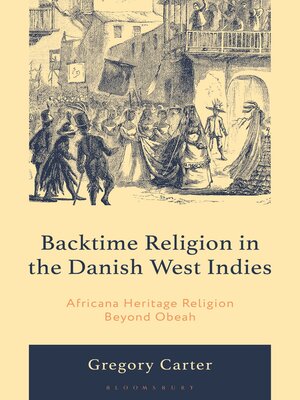Backtime Religion in the Danish West Indies
ebook ∣ Africana Heritage Religion Beyond Obeah · The Black Atlantic Cultural Series: Revisioning Artistic, Historical, Literary, Psychological, and Sociological Perspectives
By Gregory Carter

Sign up to save your library
With an OverDrive account, you can save your favorite libraries for at-a-glance information about availability. Find out more about OverDrive accounts.
Find this title in Libby, the library reading app by OverDrive.



Search for a digital library with this title
Title found at these libraries:
| Library Name | Distance |
|---|---|
| Loading... |
During the era of slavery in the Danish West Indies, a distinct Africana heritage religion was developed by the enslaved population that relied on performative expression, and Gregory Carter traces this heritage.
This spiritualty shared many attributes with other African heritage religions throughout the African Atlantic, including belief in spirit powers, the veneration of ancestors, polyrhythmic music, dance, costumed masquerade performance, reliance on herbalism and spirit mediumship. Simultaneously, they also incorporated Evangelical Lutheran/Moravian Christianity and the practice of altaration. Backtime Religion in the Danish West Indies: Africana Heritage Religion Beyond Obeah contends that the altaration of the human body is key to conceptualizing how enslaved Africans and their descendants contended with the terrible conditions inherent to slavery, the dislocation of spiritual connections from Africa, and built a renewed and living spiritual understanding on the Danish islands. To prevent loss of cultural knowledge and spirituality, the Danish West Indian enslaved community adapted to life on the islands with immediate pragmatism and took in every available means to regain connection to spiritual power available, containing and hiding this spirituality within living human bodies. Through in-depth research, Carter provides insight into how this religious practice, African heritage, and culture continue to impact the present-day Virgin Islands.
This spiritualty shared many attributes with other African heritage religions throughout the African Atlantic, including belief in spirit powers, the veneration of ancestors, polyrhythmic music, dance, costumed masquerade performance, reliance on herbalism and spirit mediumship. Simultaneously, they also incorporated Evangelical Lutheran/Moravian Christianity and the practice of altaration. Backtime Religion in the Danish West Indies: Africana Heritage Religion Beyond Obeah contends that the altaration of the human body is key to conceptualizing how enslaved Africans and their descendants contended with the terrible conditions inherent to slavery, the dislocation of spiritual connections from Africa, and built a renewed and living spiritual understanding on the Danish islands. To prevent loss of cultural knowledge and spirituality, the Danish West Indian enslaved community adapted to life on the islands with immediate pragmatism and took in every available means to regain connection to spiritual power available, containing and hiding this spirituality within living human bodies. Through in-depth research, Carter provides insight into how this religious practice, African heritage, and culture continue to impact the present-day Virgin Islands.







